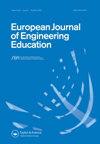帮助教师和设计师在共同设计工业工程游戏时完成个人任务的工具-应用于创新管理游戏的设计
IF 2.8
Q2 EDUCATION & EDUCATIONAL RESEARCH
引用次数: 0
摘要
本文章由计算机程序翻译,如有差异,请以英文原文为准。
Tools to help teachers and designers complete individual tasks when co-designing industrial engineering games – Application to the design of an innovation management game
ABSTRACT Serious games (SGs) offer an engaging format for teaching industrial engineering (IE) methodologies. IE methodologies involve people following a process in a set of conditions to design, improve and install systems, which are easily scripted into gameplay. The scholarship has proposed co-design approaches for teachers and SG designers. However, teachers are not always ready to engage, and designers can readily create SG elements rapidly alone. We propose a co-design framework to distinguish their roles and four tools for them to better embed relevant expertise in the SG design process. A first tool is a domain decomposition model, which helps teachers create the knowledge repository for an IE methodology. Then, a specification vector is provided to define clear learning objectives. The third tool is a mapping table that inspires designers building gaming elements based on the learning objectives. The final tool is a verification table that helps check whether the learning experience offered by a SG is aligned with its learning objectives. A game on innovation management was designed that adopts the co-design framework. It was tested in three sessions with 23 players, resulting in a playful learning experience .
求助全文
通过发布文献求助,成功后即可免费获取论文全文。
去求助
来源期刊

European Journal of Engineering Education
EDUCATION & EDUCATIONAL RESEARCH-
CiteScore
7.30
自引率
13.00%
发文量
64
期刊介绍:
European Journal of Engineering Education is published six times a year in print and electronic editions and provides an essential forum for dialogue between researchers and specialists in the field of engineering education, at European and worldwide levels. European Journal of Engineering Education is the Official Journal of SEFI, the Socièté Européenne pour la Formation des Ingénieurs (the European Society for Engineering Education). SEFI is a non-governmental organization whose aims are to develop information about engineering education, to improve communication and exchange between professors, researchers and students and to promote cooperation between the various institutions concerned with engineering education.
 求助内容:
求助内容: 应助结果提醒方式:
应助结果提醒方式:


